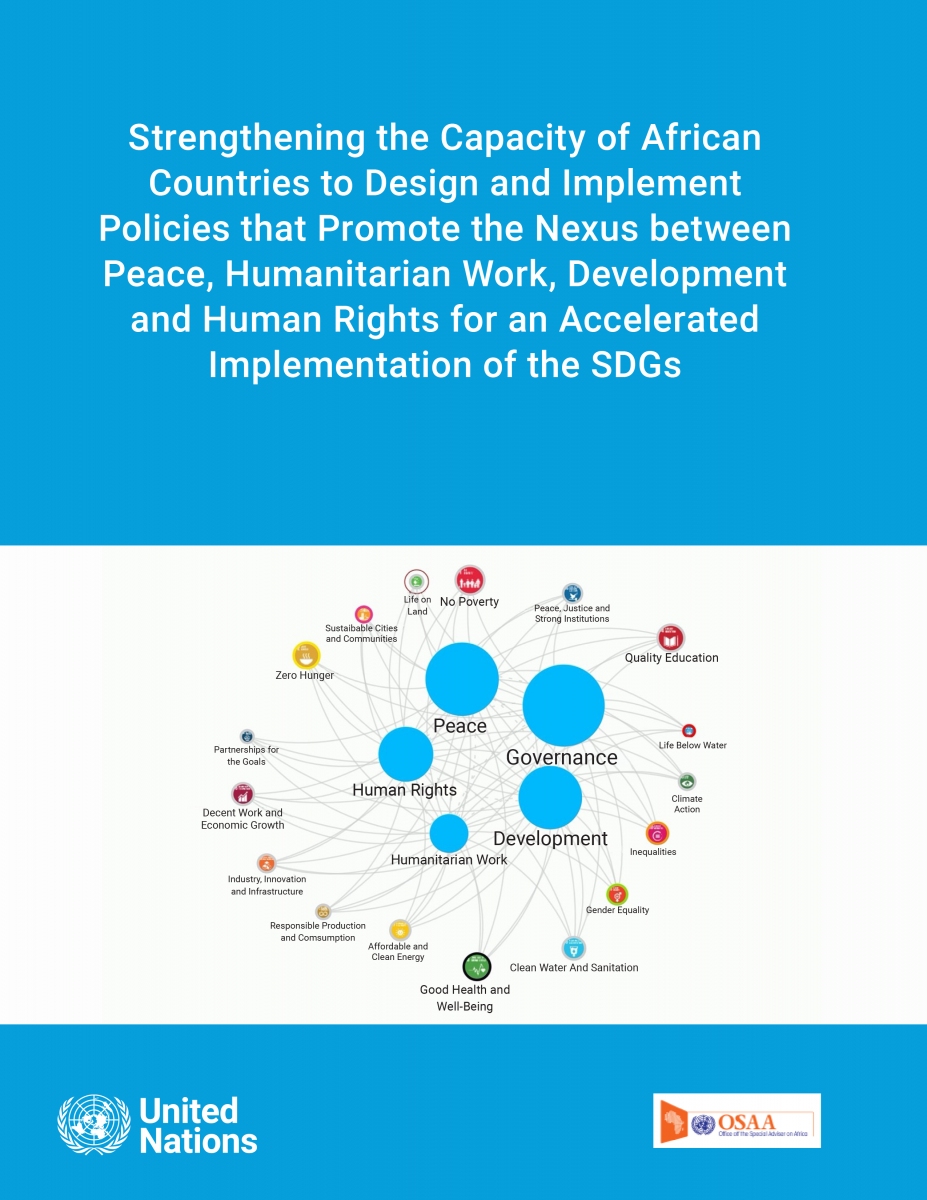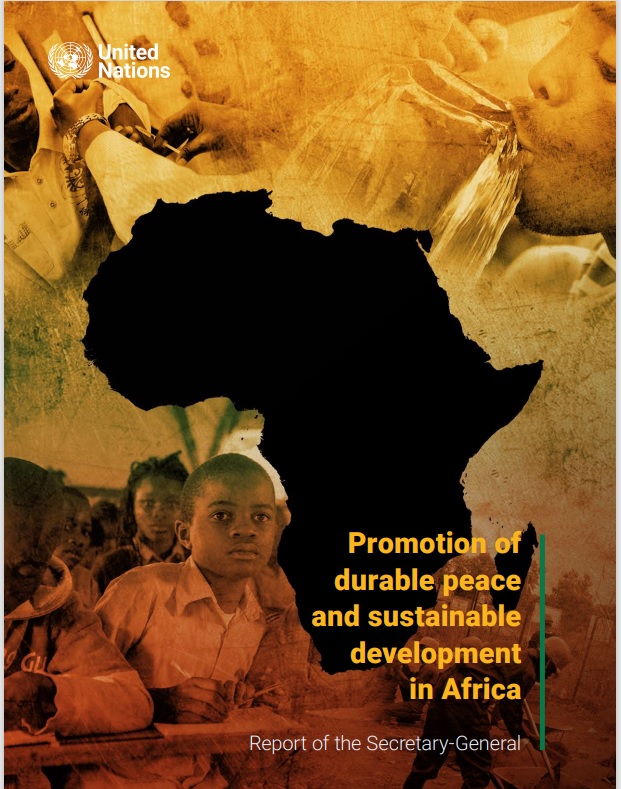Sustainable Development to Deliver Sustainable Peace

Mouna Awata is the president of the Women’s Peace Hut (Case de la Paix) in Gao UN PhotoKani Sissoko
National governments and local level stakeholders in Africa have the primary agency in sustaining peace on the continent in line with the African Union Silencing the Guns initiative. A comprehensive understanding of conflict drivers, including external and historic, is a prerequisite to sustainable peace. Only by addressing conflict drivers could societies meet the Sustainable Development Goals, in line with the UN’s Sustaining Peace Agenda. To be effective, support to national actors should leverage the four pillars of the United Nations (peace and security, human rights, rule of law, development), in other words, effective support requires a nexus approach. Building resilient national capacities that can help counter structural inequalities, exclusion, and other drivers that undermine social cohesion should be at the front and center of the UN’s support to Africa. If such drivers are neglected, they may over time lead to violent conflict and risk undermining the sustainable development goals.
Publications
Promotion of Durable Peace and Sustainable Development in Africa
Report of the Secretary-General on the Promotion of Durable Peace and Sustainable Development in Africa
The 2025 edition of the report provides an overview of the peace and security landscape in Africa, the continent’s progress towards the Sustainable Development Goals, and the interlinkages between peace and security, development, humanitarian action, and human rights in accelerating progress. Issued as Africa enters the second half of the implementation period for the 2030 Agenda for Sustainable Development, launches the second 10-year implementation plan (2024–2033) of the African Union Agenda 2063, and prepares for the Summit of the Future, the report underscores the urgency of assessing and accelerating progress, particularly in conflict-affected countries. It also addresses the rule of law in Africa from the perspective of the people-centred approach outlined in the Secretary-General’s 2023 New Vision for the Rule of Law, recognizing its vital importance as a foundation for inclusive sustainable development, conflict prevention, and peace. The report highlights how persistent and emerging challenges to the rule of law and access to justice hinder economic opportunities, erode social cohesion, and undermine political stability, fuelling conflict and creating opportunities for harmful non-state actors, particularly extremist groups, to fill the void. Examples of people-centred approaches to addressing rule of law challenges on the continent are also provided.
Available in black and white (Arabic, Chinese, English, French, Russian, Spanish)
The Peace and Development Nexus in Africa: Governance, Financing and Country Systems - A Planning Guide
This publication by the United Nations Office of the Special Adviser on Africa (OSAA) presents an integrated framework for applying the peace and development nexus in Africa, linking peace, sustainable development, financing, and institutional capacity. It provides practical tools, including logical and measurement frameworks, and data curation methods, to support evidence-based, context-sensitive planning. Designed for policymakers, planners, and development actors, the approach complements OSAA’s online course, The Peace and Development Nexus in Africa, and promotes coherent, long-term solutions that move beyond fragmented, siloed interventions.
How Home-Grown School Feeding Crowds in Development and Crowds Out Instability: The Low Hanging Fruit
State absence, weak governance systems and poor public service provision are creating conditions of chronic insecurity and instability across the continent. The absence of access to health, education, employment, and sustainable livelihoods remains significant drivers of fragility and growing insecurity. This paper presents Home Grown School Feeding Programme (HGSFP) as policy instrument for government to address the absence of state services in conflict areas, helping restore trust and legitimacy..
Home-Grown School Feeding: From Hot Meal to Macroeconomic Tool - A Low-Hanging Fruit for Africa’s Urgent Challenges
This policy paper positions Home-Grown School Feeding (HGSF) as a transformative, Africa-led approach to advancing resilience across the continent, applying lessons learned from the Millennium Development Goals era. HGSF creates a bridge between education, agriculture, and community development that can be leveraged to tackle the interconnected “Triple Paradoxes” of Financing, Energy and Food Systems hampering Africa's progress.
With returns as high as $9 for every $1 invested, HGSF offers a practical, immediate intervention to tackle Africa’s urgent needs while contributing to the continent's long-term development goals. By integrating the four essential dimensions of Peace and Security, Energy Access, Climate Adaptation, and Food Systems Transformation, HGSF programmes deliver sustainable benefits that extend beyond school meals. Equipped with renewable energy delivered through HGSF initiatives, schools serve as hubs for education, climate-smart practices, and local food production, helping stabilize rural economies and enhance state presence.
Integrating energy access, climate adaptation, and food systems goals into these programmes can potentially double the return on investment. This paper illustrates how Africa-led, context-specific solutions can deliver immediate impacts and support the long-term resilience needed to achieve the Sustainable Development Goals (SDGs) across the continent. It underscores the continent's capacity to lead its own transformative development path through inclusive, home-based solutions like HGSF.
Strengthening the Capacity of African Countries to Design and Implement Policies that Promote the Nexus ...
This baseline assessment study contributes towards promoting the synergies between the pillars of peace and security, humanitarian work, development and human rights in order to accelerate sustainable development across Africa. Notably, the pivotal role of governance for the practical outcomes of policy implementation and service delivery cannot be understated. It provides a baseline assessment of the degree of awareness and capacity of African countries in formulating and implementing coherent and integrated policies on the nexus. It provides extensive literature on the concept and underlying principles and definitions of the peace, security, development and humanitarian linkage or triple nexus tracing its evolution against the background of the escalation of violent conflicts and crises over time including the Grand Bargain and New Way of Working (NWoW).
2021 Causes of Conflict and the Promotion of Durable Peace and Sustainable Development in Africa
This report is prepared by the Office of the Special Adviser on Africa (OSAA) in response to the General Assembly resolution 74/302 requesting the Secretary-General to monitor and report on an annual basis on persistent and emerging challenges to the promotion of durable peace and sustainable development in Africa. Other departments, offices, agencies, funds and programmes of the UN system contributed to the report through the Inter-Departmental Task Force on African Affairs (IDTFAA). In implementing this mandate, OSAA also engaged with a broad range of stakeholders, including Member States, non-governmental and civil society organizations, the private sector, academia, women and youth groups.
Mapping Study of the Conflict Prevention Capabilities of African Regional Economic Communities
 This publication assesses the conflict prevention capabilities of the African Regional Economic Communities (RECs), with an aim to raise global awareness and mobilize international support for efforts being made the RECs in enhancing their institutional capacities to better assist their Member States in preventing conflict and sustaining peace. Specifically, the publication maps: (i) the geopolitical context that informs the work of the RECs on conflict prevention, (ii) the existing organizational structure of each REC, as well as their institutional mandates, policies, structures, tools, strategies and programmes, partnerships and resources for conflict prevention, (iii) their current challenges, gaps and capacity needs, covering both operational and structural dimensions, and (iv) entry points and opportunities for strengthening the institutional capacities of the RECs on conflict prevention. Seven of Africa’s eight RECs are covered in the publication, which was based on a study that utilized a combination of methods – namely: one-on-one in-depth interviews, focus group discussions, desk review of internal documents and an expert group meeting involving the representatives of the RECs and other experts from African regional organizations, civil society and development partners.
This publication assesses the conflict prevention capabilities of the African Regional Economic Communities (RECs), with an aim to raise global awareness and mobilize international support for efforts being made the RECs in enhancing their institutional capacities to better assist their Member States in preventing conflict and sustaining peace. Specifically, the publication maps: (i) the geopolitical context that informs the work of the RECs on conflict prevention, (ii) the existing organizational structure of each REC, as well as their institutional mandates, policies, structures, tools, strategies and programmes, partnerships and resources for conflict prevention, (iii) their current challenges, gaps and capacity needs, covering both operational and structural dimensions, and (iv) entry points and opportunities for strengthening the institutional capacities of the RECs on conflict prevention. Seven of Africa’s eight RECs are covered in the publication, which was based on a study that utilized a combination of methods – namely: one-on-one in-depth interviews, focus group discussions, desk review of internal documents and an expert group meeting involving the representatives of the RECs and other experts from African regional organizations, civil society and development partners.







